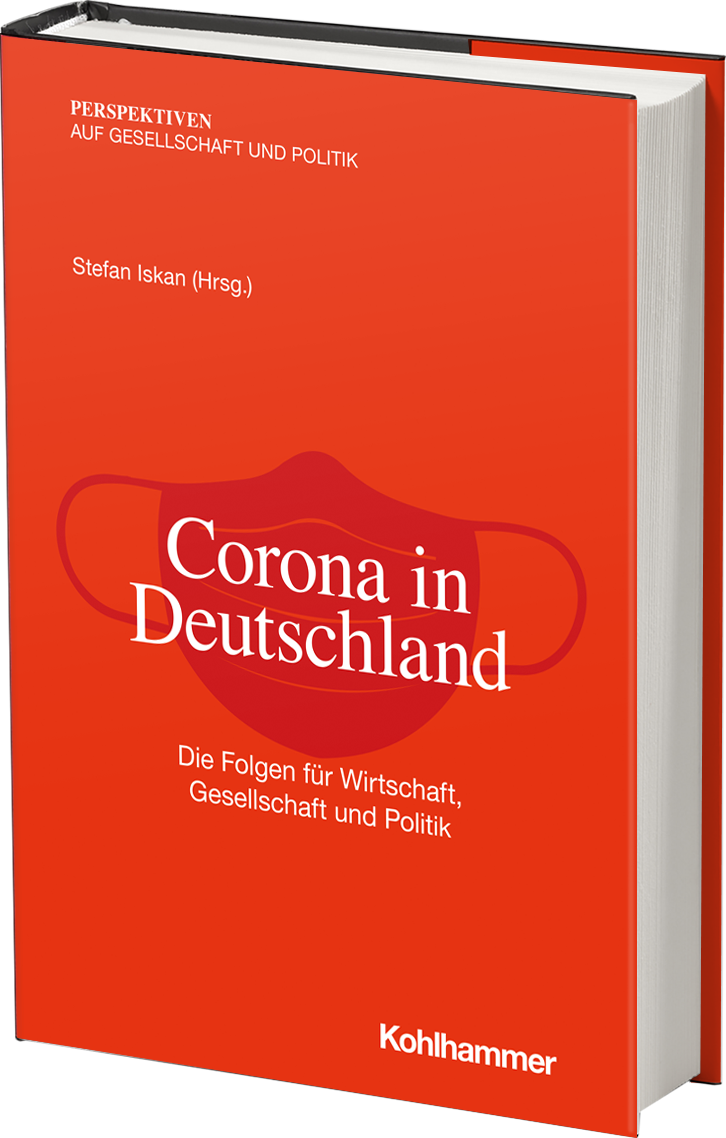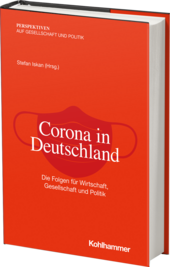Prof. Dr. Stefan Iskan, Chair of Logistics and Business Informatics, esp. Automotive SCM and Digitalization, and Head of the Master's program in Logistics at HWG LU, publishes a book on the Corona crisis. In an interview with Kohlhammer-Verlag, he provides initial insights.
What started locally in Wuhan, China, has become an event of the century: COVID-19. But how does Germany stand before, during and after the great pandemic? Experts from various disciplines - history, medicine, economics, IT, political science and journalism - address this question in "Corona in Germany," edited by Stefan Iskan. From these different perspectives, the team of authors illuminates the contexts and consequences of the current Corona crisis. The pandemic is placed in a broader historical context and one learns what the Corona crisis ultimately entails for the economy, society and politics.
The book, with contributions by Stefan Iskan, David Engels, Timo Ulrichs, Karl-Rudolf Korte, Tanjev Schultz, Robert Kölbl and Pelin Iskan, was published by Kohlhammer-Verlag in Stuttgart on September 1, 2020.
Prof. Dr. Stefan Iskan in an interview with Kohlhammer-Verlag about his book "Corona in Germany" and why the major geo-strategic thematic blocks of the future are no different from those of the "pre-Corona era"
Mr. Iskan, your book "Corona in Germany - The Consequences for Economy, Society and Politics" aims to provide a perspective for the future. However, the current figures for new infections are worrying. Where do you get this optimism and confidence from?
In every crisis there is also a treasure trove of opportunities. Opportunities for the state, companies and each and every one of us ourselves. I am convinced of that. Detached from the medical component, which Timo Ulrichs precisely unravels in the book, people could also face the Corona pandemic with its various, systemic consequences with a certain amount of confidence. For this pandemic - as the historical dimension in our book shows - is no exception in world history. In questions of course, measures and possible consequences, mankind does not seem to be entering new territory at all. Therefore, in the upcoming period, which will be characterized by radical changes, there are certainly components to which we can orient ourselves. And from a sociological perspective, Karl-Rudolf Korte also concludes in our book that narratives about the future can act as a mobilizing force in politics. Incidentally, this also applies to decision-makers in the business world. So I am not only a logistician, but also a realistic optimist.
But you also state that "companies and public institutions are no longer driving into the future. Doesn't that contradict itself?
Not at all. Because this sentence is linked to a central condition. In my eyes, we at Corona are dealing with such a deep crisis and such a huge change, from which - unlike the financial crisis of 2008/209, for example - we can no longer get out with a simple but brutal cost cutting. We already had a megatrend before the Corona crisis - namely digitalization. This is shown very clearly in the article by Robert Kölbl and myself. States, public authorities and also companies that do not now simultaneously invest in "making themselves fit for the future" in addition to rigorous cash management will no longer emerge from this crisis without massive damage. The Corona crisis will be their neckbreaker. The overriding credo in the Corona crisis must be: Cash management and investing. In parallel!
In your book, you call on people in Germany not to lose sight of the "big picture. What do you mean by that?
Many topics are only overshadowed by the Corona pandemic, as Tanjev Schultz impressively shows in his contribution to our book. We would be well advised to detach ourselves from the turmoil of micro-reporting and adopt a kind of helicopter perspective. Then we will find that the very large geo-strategic issue blocks of the future are not much different from those of the pre-Corona era. That's what I want to bring to people's attention with the book.
And what then are the big issues in your eyes?
In addition to climate change, this certainly includes the trade war between the U.S. and China. Or let's talk about the battle for technological supremacy and the race for digital currency sovereignty. But it also includes China's New Silk Road, geostrategy par excellence. The trend toward even larger budget deficits worldwide and the dovetailing of politics with the economy, the inflation of sought-after assets and the resulting spread in our society. But also worth mentioning are the consequences for the real estate market, the role of digitalization, industry winners and losers, and ultimately job substitution. But also issues that go hand in hand with an Industry 4.0 world in emerging markets that has been thought through to the end. A development that could not only undermine social stability locally, but even endanger global stability as a whole.
(Interview: Kohlhammer-Verlag)
Prof. Dr. Stefan Iskan (ed. and co-author)
Professorship for Logistics and Business Informatics, esp. Automotive SCM and Digitalization, and Head of the Master's program in Logistics at the Ludwigshafen University of Applied Sciences.
Other authors in the book include:
Prof. Dr. Tanjev Schultz, professor at the Journalism Seminar and the Institute for Journalism at the Johannes Gutenberg University in Mainz. The former journalist for the Süddeutsche Zeitung has been awarded the Nannen Prize, the most prestigious honor for journalists in Germany, for his reporting on the NSU trial. His areas of specialization include conspiracy theories, extremism/terrorism, freedom of the press, trust in the media and investigative journalism.
Prof. Dr. Karl-Rudolf Korte, Professor of Political Science at the University of Duisburg-Essen in the field of "Political System of the Federal Republic of Germany and Modern Governance Theories." He is also director of the NR School of Governance. Karl-Rudolf Korte regularly appears in the media as a guest for election analyses in the context of federal elections.
Prof. Timo Ulrichs holds the Chair of Global Health and Development Cooperation at Akkon University in Berlin. Timo Ulrichs previously worked on infection and immunobiological issues at the Max Planck Institute and the Charité in Berlin. As an advisor at the German Federal Ministry of Health, he was responsible, among other things, for epidemic protection and pandemic influenza planning. In the media, Timo Ulrichs is currently a regular guest on NTV, among others, to assess the corona pandemic development in Germany.
Robert Kölbl is an expert in IT security issues, databases as well as telecommunications and high availability solutions. As an IT system integrator, the owner of Systemhaus Kölbl works at the interface of hardware software and process automation in industry, trade and the hotel industry. Robert Kölbl is a partner of the Japanese IT and telecommunications group NEC.
Pelin Iskan, Assistant and Project Manager to the Center Manager Mercedes-Benz Cars Purchasing and Supplier Quality Exterior and Van Purchasing within Daimler AG in Stuttgart. The economist was previously an executive assistant at Deutsche Bahn Group (DB Schenker) and senior buyer at BASF headquarters for inbound logistics service provider purchasing. Pelin Iskan is currently pursuing a part-time doctorate at the Chair of Industrial Management (Prof. Dr. Ronald Bogaschewsky) at the University of Würzburg and has teaching assignments at the Ludwigshafen University of Applied Sciences in the areas of purchasing/supplier management and human resources management.






